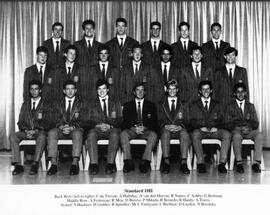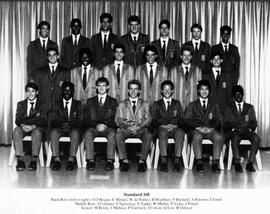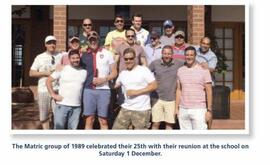A Trip Down Memory Lane - 2020 Rugby Tour
- ZA ZAR STDS 202000927
- Pièce
- 2020
A trip down memory Lane by: Gus Garcia – Old Boys St David’s
It is 2020 and I’m feeling totally nostalgic to reflect back on my years at St David’s, which ended 31 years ago, but whose memories remain as vivid as though they were only yesterday. Perhaps this is because my son Kiko is in his Matric year and I have been fortunate enough to relive a second school experience through his journey at St David’s. I have been frequently struck by the similarities of the school, then and now, in terms of the fundamental ethos and values, which have not deviated nor been altered in any way. St Davids has steadfastly refused to change its core character in a fast changing environment and results orientated world. The School has suffered and faced many challenges over the years, only to re-emerge stronger, brighter and wiser for having withstood these headwinds.The Marist Brothers ethos of family, community, simplicity, humility and reflection through prayer and mass, are ubiquitous in all aspects of school life. Whilst these values are not always apparent in ones early years, these essential truths reveal themselves as one progresses in age and consciousness. How amazing was it to discover that my son was being taught by 4 teachers who taught me. How satisfying to watch the accepting demeanour of our boys, truly representing our cosmopolitan nation, roaming the school and the playground.Walking the corridors after so many years brought in a rush of memories both good and bad. The laughs, the tears and the shared hopes and fears of my fellow brothers. Some have passed on, others are in far away lands and yet others remain close at hand, but all are remembered and loved. St Davids was never considered a top sporting school and yet every age group punched well above their weight in all categories. In fact being the perennial underdog resulted in a tighter knit group and forged friendships and brotherhoods for life. Representing the St David’s first team for rugby was a cherished moment for me and one I could share joyfully with my son when he was asked to join the touring team in 2020. It has been 18 years of wonder and joy watching you develop into a wonderful young man. I am excited for Kiko and his band of brothers who will embark on a fantastic adventure, irrespective of whether they win, lose or draw, so long as they cherish the endeavour and the journey and most importantly take courage to be men of virtue and value.
Egenrieder, Julie




